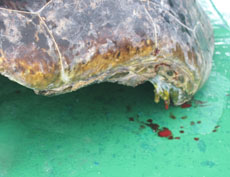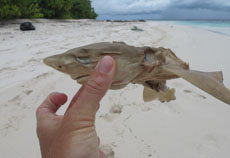The Maldives Port Workers Union (MPWU) have accused Maldives Ports Limited (MPL) of forming a “paper union” to shove aside the alleged violation of employee rights by the state corporation.
Sacked MPL employee and President of MPWU, Ibrahim Khaleel, told Minivan News that his former employer was trying to “fabricate the truth” about the violations of rights of their employees.
The ‘Maldives National Port Workers Union’ was formed just five days after MPL received a letter from the Asia Pacific Regional Office of International Transport workers Federation (ITF), which had raised concerns over the alleged employment rights violations.
“[ITF] sent a letter raising concerns of the employment violations in MPL to its management. So what they did was instead of addressing the issues and concern, they formed a paper union, legally recognised it and made the Maldives Port Workers Union illegal,” Khaleel explained.
He further claimed that MPL had labeled the union – which is registered with the ITF and International Labour Organisation (ILO) – as a “political gang” working against the current government of President Mohamed Waheed Hassan.
“They are attempting to destroy the union by sacking its leaders, including myself, and suspending or taking action against those who raise their voice. This is unconstitutional,” Khaleel challenged. “The constitution ensures us the right to freedom of assembly, right to strike, and freedom of expression. They terminate our employment contract because we practised our constitutional rights.”
MPL Media Coordinator Ibrahim Rilwan did not respond at time of press.
Exchange of letters
In a document received by Minvan News, MPL Chairman Abdul Matheen Ahmed allegedly responded to ITF’s Asia Pacific Regional Office, stating that MPL was “extremely surprised” by the statements in ITF’s letter.
The letter addressed to ITF official Mahendra Sharma further stated that the MPL as “a corporate entity” exercises its “right to take disciplinary action against staff when they are in breach of their employment contract”, and said it had been the practice since the formation of the company.
MPL, in the letter, further claimed that it did not “deviate from any Maldivian government regulation” during the course of its action and “will not do so in the future”.
“Hence we are quite surprised on this issue you are talking about. Please make this clearer to us. As to the events you have stated in the letter, we are sure it has not taken place in our company and nor is our human resource department aware of any such issues,” read the letter.
The letter also goes on to describe the MPWU as an “unfounded, illegal association”, attempting to defame the MPL.
“Moreover let us bring to your notice, given the present political situation in Maldives’, many such unfounded, unauthorised illegal so-called associations and unions could be sending you such letters, to try and defame the government internationally.”
“It would be our humble request for your organisation not to get entangled in such unfounded allegations brought forward by politically’ motivated groups and gangs,” Abdul Matheen Ahmed wrote.
MPL requested the ITF communicate instead with the “Maldives National Port Workers Union (MNPWU)” -the ‘paper union’ Khaleel has alleged was created by the ports authority itself.
The MNPWU meanwhile dismissed all claims of the MPWU and said that no employment rights violations were taking place.
ITF General Secretary responds
Meanwhile, another letter received by Minivan News, which was sent by the General Secretary of ITF David Cockroft to President Waheed, described MPL’s actions as “an anti-union campaign” and raised concerns over “the systematic targeting” of the leaders of MPWU and its members by MPL.
The letter strongly rebutted the assertions made by the MPL Chairman that the ITF had not fully examined the facts surrounding the situation, and said it takes “serious cognisance” in situations where workers were “denied trade union rights, threatened and victimised” for conducting legitimate trade union activities.
“May I also draw your attention to the fact that the ILO warranted the MPWU complaint legitimate enough to write to the Maldives government concerning the issues which have been raised with it,” read the letter.
The letter also contested the MPL’s claim over the legitimacy of MPWU, where it stated: “The Maldives Port Workers Union is an officially registered trade union, having received its registration certificate from the Ministry of Home Affairs on 29th May 2011. It was also a member of the Maldives delegation to the ILO’s International Labour Conference held in June 2011,”
“On 29th August, the ITF Regional Secretary for Asia Pacific received a written response from Abdul Matheen Ahmed, the Chairman of Maldives Port Limited which incorrectly referred to a different union and which denies that the termination of employment of the MPWU’s President, an MPWU Executive Member and 6 MPWU members, the suspension of a further 49 MPWU members, and the reassignment of many other MPWU members to other ports has taken place,” read the letter.
The letter also raised doubts over the alleged ‘paper union’, the MNPWU, stating that it “appears to have been registered at the Ministry of Home Affairs five days after our Regional Secretary sent his correspondence to the Chairman raising the serious trade union rights violations within Maldives Port Limited”.
Cockroft, in the letter, further urged President Waheed to ensure that the Maldivian constitution and employment laws were fully respected and upheld by the MPL.
“I request that you use your office as President of the Republic of Maldives to instruct the Chairman and management of Maldives Port Limited to respect the country’s constitution and employment laws and immediately halt their anti-union campaign against members of the MPWU, and to enter into a real dialogue and conciliation process with MPWU which will result in a negotiated settlement which addresses the legitimate grievances of members of the MPWU.”
‘Maldives National Port Workers Union’
Speaking to Minivan News, a founding member of the new Maldives National Port Workers Union, Ibrahim Rasheed, said the union was registered last month and it was “very difficult” for him to comment on it because they were still working on the inaugural meeting and the elections of the union.
“Yes, we registered the union last month. But we still have to hold the inaugural meeting and the elections so it is very difficult to comment on the union or what we plan to do,” he said.
Asked why another union was formed when MPWU already existed, or if the union was formed because MPWU had failed to do its job, Rasheed simply said that it was not because MPWU was not upholding the rights of the employees but because “anybody can form a union.”
“It is not like that. You see, even in some islands there are more than one association, so like that what is wrong with having two or even five unions? That is why we thought of making another union,” he said.
Rasheed assured Minivan News that the MNPWU would provide more details about itself, and assured the publication it would be invited to cover the inaugural meeting.
However, Rasheed later called Minivan News back, referring it to another individual, stating that this person “would give more information” about the union.
“You should also call the number I gave. He is more active. You know, even if a couple forms a company, it would usually be the husband who would get more involved, so like that he is more involved in it than I am,” Rasheed said.
The phone number Rasheed provided was switched off when Minivan News called it.
Political motive
In April 2012 seven staffs at MPL were suspended from their jobs at the state company for participating in protests held by ousted Maldivian Democratic Party (MDP)’s anti government protests.
MPL Media Coordinator Ibrahim Rilwan at the time confirmed the suspensions, but said he did not know the specifics regarding the case. The code of conduct does not prohibit participation in political activities, but staff can be disciplined if they transgress good behavioral norms, he added.
However some staff at MPL alleged that the senior officials of the state corporation had warned employees to not to participate in protests, and that action would be taken by those who do.
An employee who wished to remain anonymous said, at the time, that he too had been warned by his directors not to attend MDP protests. Furthermore, he added that he had not yet seen the company’s code of conduct.
“They do not share the code of conduct when they recruit you. I have not seen this, I don’t think anyone has. I don’t even know what it says,” he said.
“A lot of MPL staff are MDP supporters. So the senior staff send people to MDP protests to monitor and take pictures of who attends. The whole point of this is intimidation,” he alleged.
Last July, MPWU accused the MPL of violating employee rights, alleging the state-owned company had unfairly dismissed four employees due to their political activism.
In a letter sent on July 12 to MPL CEO Mahdi Imad, MPWU President Khaleel said: “Although the constitution guarantees freedom of expression and freedom of assembly, it is now common within MPL to stop employees from expressing certain political views, and violate the employment act by unfairly dismissing employees and transferring employees to different departments without prior warning or explanation of any offense committed.”
Following the concerns of MPWU, The World Federation of Trade Unions (WFTU) expressed concern over the allegation claiming “infringement of trade union rights and freedoms,” and called upon President Waheed to immediately terminate its “attack” on members and the leadership of the MPWU.
Meanwhile, last month a leaked audio of former Deputy CEO of MPL Ahmed Faiz discussing the hiring of individuals to loudly promote President Waheed in local cafes.
In the 15 minute audio, Faiz spoke in detail about his intention to hire his audience as government supporters, President Waheed’s reluctance to maintain ties with the Progressive Party of Maldives (PPM), an intention to “wipe [former President] Maumoon out of the political picture”, other problems arising in the current ‘unity’ government, his own influence within the State Trading Organisation (STO), and large amounts of money being illicitly obtained.
“What I’m saying is, this government is now appointing people to different posts and it’s getting structured in the manner we want. Now there are a lot of things that I can do. Material benefits can be gained, and lots of other things. Credit from STO (State Trading Organisation) worth millions of rufiya, that’s absolutely welcome,” he says in the alleged audio clip.
Faiz also stated his intention to gain wealth and money in the audio clip, saying no means would be spared.
“I will only be able to acquire money when the condition to getting more money is put in place. We’ll be able to get more money now than we have ever managed to get from this country all our lives. This is what I want. I want money too,”
Faiz is a member of President Dr Mohamed Waheed Hassan’s Gaumee Itthihaad Party (GIP), and was previously appointed by him as the Managing Director of the Maldives National Broadcasting Corporation (MNBC).
Likes (0)Dislikes
(0)Dislikes (0)
(0)
 (0)Dislikes
(0)Dislikes (0)
(0)
